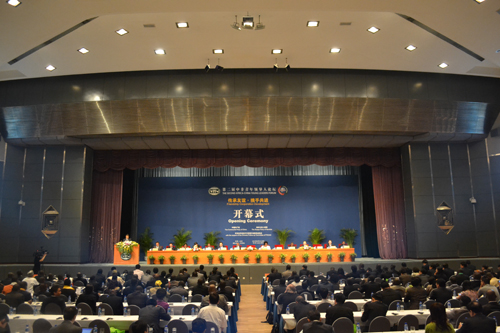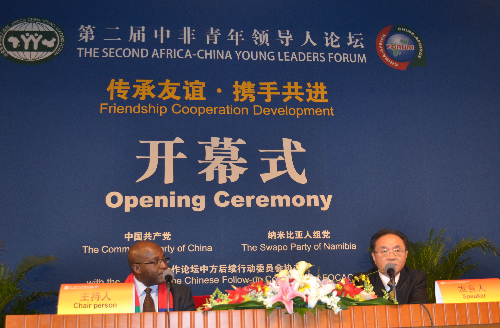|
 |
|
STRENGTH IN YOUTH:The Second Young Leaders Forum opens in Beijing on July 18 (PHOTO BY LIU JIAN) |
Last month, hundreds of African and Chinese youth leaders descended on Beijing. They had already met once before in Windhoek, Namibia's capital. One year later, they convened again to discuss new issues at the Second Africa-China Young Leaders Forum, which ran between June 18 and 19.
"With the deepening of China-Africa relations, Chinese and African young people play bigger roles in their countries' development," said top political advisor Jia Qinglin in his keynote speech at the opening ceremony. "Youth exchanges have become an integral part of China-Africa relations," he said. Jia is member of the Standing Committee of the Political Bureau of the Communist Party of China (CPC) Central Committee, and also chairman of the National Committee of the Chinese People's Political Consultative Conference.
Around 100 youth leaders at the forum hailed from 38 African countries. Initiated last year, the event was co-hosted by the CPC and the South West Africa People's Organization (SWAPO) Party of Namibia, with support from the Chinese Follow-up Committee of the Forum on China-Africa Cooperation (FOCAC).
"Young leaders should make new contributions toward enhancing China-Africa friendship and safeguarding the common interests of developing countries," says Pendukeni Iivula-Ithana, Secretary General of Namibia's SWAPO Party. She hopes the two sides can discuss common interests in many areas and has proposed to set up an Africa-China fund for future exchange and cooperation projects.
At the first session on June 18, Chinese and African delegates discussed how Chinese and African young leaders may better inherit and carry forward Africa-China relations into the future. Areas under discussion ranged from language learning and volunteering to skills training and the role of media and the press. One spotlight discussion dealt with communication.
Representatives from Chinese media outlets were present at the forum. "Communication not only concerns what you want to say to others," says Wang Gangyi, President and Editor-in-Chief of Beijing Review. "It's two-way traffic." Wang believes the Chinese have much to learn from the African people, particularly when it comes to rich cultural heritage, higher awareness of the harmony between man and nature, and desire for further development. He believes that media can play a positive role in this regard.
|

|
|
Wang Gangyi, President & Editor-in-Chief of the magazine Beijing Review says Chinese media should play a positive and effective role in China-Africa youth exchanges at the first plenary session (PHOTO BY LIU JIAN) |
African participants – many who generally believe that China's media outlets are friendly to Africa – echo Wang's sentiments. "I hope the Chinese media can play a positive role in reversing the distorted image of Africa in the Western media," says Moroccan Erfiki Hicham, a PhD candidate at Peking University. "This will definitely help our [Chinese and African] young people better understand each other."
For Martine Reuben Shigela, Secretary General of the Tanzanian Chama Cha Mapinduzi (CCM) Youth League, the trip to China provides a good learning opportunity. "I want to find out how China empowers its young people," he says. He's also keen to learn more about opportunities in China for empowering Tanzanian young people.
Most African delegates appreciate the concept of the forum and hope it can be cemented as a regular event. The issues under discussion during its gatherings are highly practical, and many attendees suggest that follow-up plans be made and implemented after the forum ends. There is a sentiment that all African countries should be on board.
Some African delegates would like to see positive diplomatic relationships between Africa and China translated at the individual level. "Unlike the relationship between governments, something deep-rooted in the hearts of people is more lasting," explains Akol Paul Kordit, a South Sudanese Political Bureau Member and Chairman of the Youth League of Sudan People's Liberation Movement (SPLM). He is quick to note that this is a challenge facing both sides.
The forum ended on June 19 with introduction of a declaration. Contained within this document are proposals for youth exchanges, but also proposals promoting rural development in China and Africa through shared technology. The possibility of technology transfers from Chinese companies operating in Africa is also detailed.
The Fifth Ministerial Conference of FOCAC will begin later in July and is expected to conclude with the Beijing Action Plan (2013-15). The declaration reached at this forum calls on ministers drafting the plan to give more consideration to young people and their hopes and aspirations. Their futures affect people of all ages and nationalities.
A New Tradition
> The first Africa-China Young Leaders Forum was held in May 2011 in the Namibian capital of Windhoek. The Windhoek Declaration, drawn up during the event, established that this particular forum would be a part of FOCAC, and responsibility for it would rotate between China and Africa, according to Cao Baijun, Director General of the Bureau of African Affairs at the International Department of the CPC Central Committee.
 |
|
The Second Africa-China Youth Leaders Forum opens in Beijing on June 18 (PHOTO BY LIU JIAN) | |